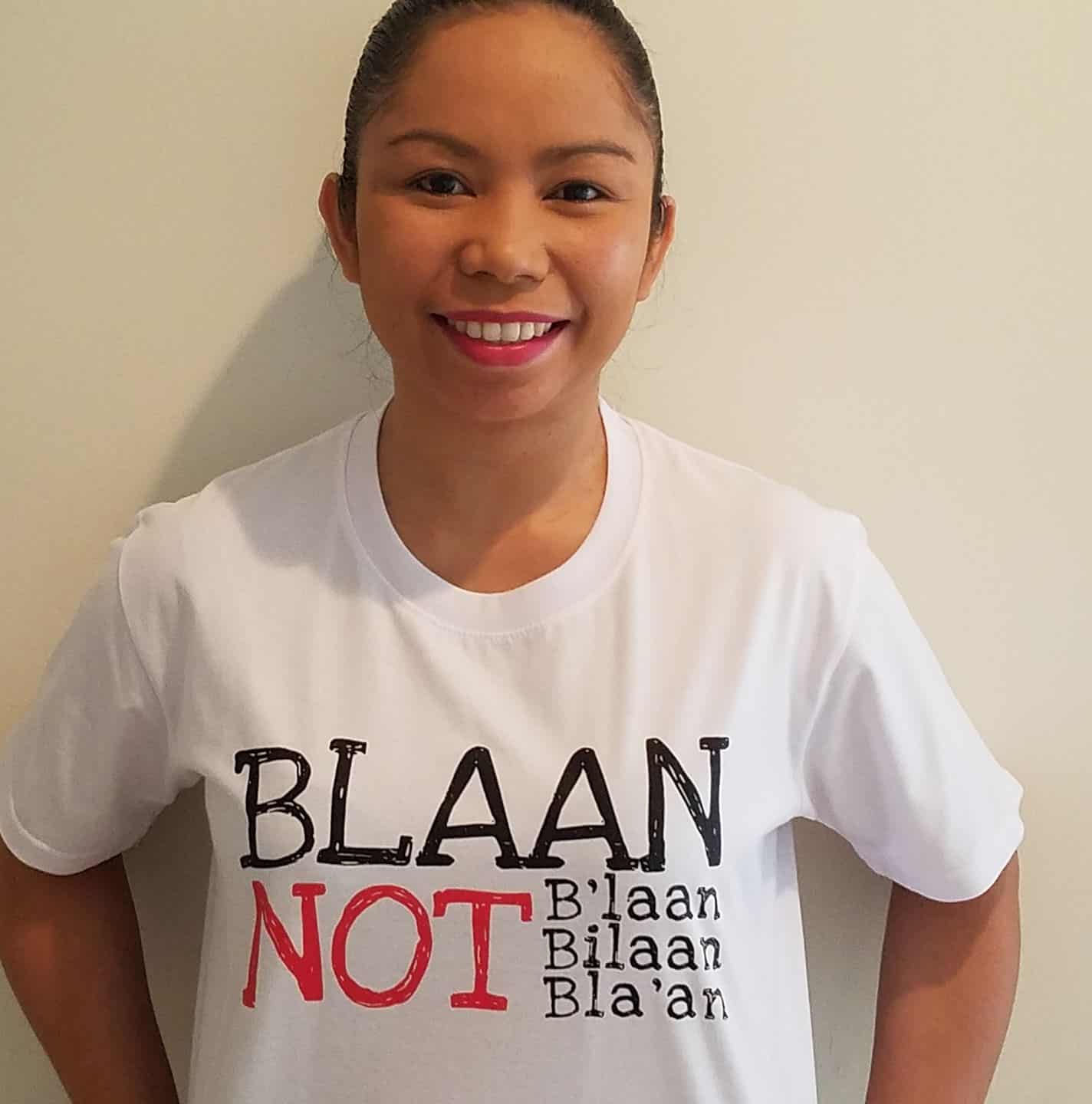Blaan folk on tribe’s name: Just drop apostrophe

PRIDE Josephine “Arjho” Cariño-Turner wears their statement shirt in this undated photo supplied by the group. —CONTRIBUTED PHOTO
GENERAL SANTOS CITY — An apostrophe may be a small mark, but for the Blaan indigenous community, ending the practice of attaching it to their tribe’s name, which changes the word’s spelling and pronunciation, means the world to them.
A group of young Blaan (pronounced bla-an) professionals has recently come forward to reassert that the tribe be not referred to as B’laan or Bilaan, both pronounced “bee-la-an,” and Bla’an. The misspelling and mispronunciation, they said, is tantamount to discrimination and utter disregard of their culture.
“Unless this simple and yet very significant part of our cultural identity is corrected, others who do not have a clue think that what they do is right,” Josephine “Arjho” Cariño-Turner, cofounder of KafyeBlaan Empowerment Inc., told the Inquirer in an online interview.
According to Turner, B’laan or Bilaan has a derogatory meaning among the indigenous peoples (IP) group that thrives in the south-central Mindanao region and has a distinct culture that developed long before migrants settled in the area.
“’Bilaan’ as used mostly by settlers is a belittling name [to] us … [implying] that we are less than others. This is not our identity … we are not Bilaan or B’laan. We are Blaan,” said Turner, who is now based in the United States.
She lamented that settlers often use the word B’laan or Bilaan to ridicule or denigrate other people with characterizations as “hayop” (animal), “mabaho” (stinky) and “walang pinag-aralan” (illiterate).
The Blaan is one of 110 indigenous peoples in the country who continue to experience marginalization, KafyeBlaan explained. Blaan also refers to the language of the tribe.
‘Counterpart tribe’
Coined from the words “bla” and “an,” Blaan literally means “counterpart tribe.”
Historically, Blaans live closely with the Tboli, which is also often misspelled as “T’boli.”
KafyeBlaan, which was organized mainly to raise awareness on the Blaan spelling and the need to change it in the records of local and national government and other concerned agencies, including its use in mainstream media.
READ: Blaan boys help keep weaving tradition alive
The group made local headway on July 22, 2015, when the city government here celebrated the First Blaan Day, declared by the national government as a special non-working holiday.
Annalie Edday, KafyeBlaan executive director then, said it was their way of “reclaiming [our] share of history, a celebration of our culture and pride.”
In its explainer, the group said there was no need to put an apostrophe after “B” in Blaan since many Blaan words follow the consonant-consonant-vowel pattern such as “fye” (good), “flafus” (morning) and “blutut” (belly button).
“Why do you have to put an apostrophe after a consonant when there is no need for it to be there?” the group asked.
For fye, it is wrong to spell it as “f’ye” then pronounce it as faye, fiye, or fuye; flafus should not be spelled “f’lafus” and pronounced as falapus, and so on.
Stopping discrimination
“We are not B’laan. We are Blaan. Blaans who are talented, educated, not damak (dirty), not hayop (animal). We are equal. We are the same as the Visayans. We are the same as the other tribes,” said Monique Kawari Sullivan, an Australia-based Blaan entrepreneur, in a video on Facebook.
In 2017, the group conducted a Blaan spelling advocacy concert, participated in by Blaan bands, to promote the correct spelling of the word and to stop the discrimination against their cultural group.
Turner said the National Commission in Indigenous Peoples (NCIP) had recognized their efforts to assert their cultural identity.
“Blaan po,” said Jennifer Pia “Limpayen” Sibug-Las, who, before her appointment as NCIP chair in September last year, served as commissioner for Central Mindanao.
The efforts of KafyeBlaan to advocate the correct spelling of Blaan reached Congress when then South Cotabato Rep. Shirlyn Bañas-Nograles filed a resolution in January 2022, urging all government agencies and departments—from the national government to the barangay—to use the correct name Blaan in all matters concerning the IP group.
Government agencies and offices at both the national and local levels have for years continued to use erroneous terms (B’laan, Bilaan, Bilanes, Biraan) in official documents, research work, online news or feature content and other publications when describing the Blaan indigenous peoples group of South Central Mindanao, Nograles said.
“The correct use of the Blaan name nationwide will help cement further equal protection of all Filipinos and prohibition of discrimination against members of the Blaan community, as provided under the Constitution,” she added.
Turner also lauded the Sarangani provincial government for adopting an IP code that incorporates Blaan as the correct spelling for the IP group and their language.
She said the Senate’s proposed Anti-Discriminatory Act recognized both Blaan and Tboli as the appropriate identity nomenclatures for the two indigenous peoples groups.
Turner brought KafyeBlaan’s Blaan spelling advocacy at change.org, but only about 200 showed their support since it was posted five years ago.